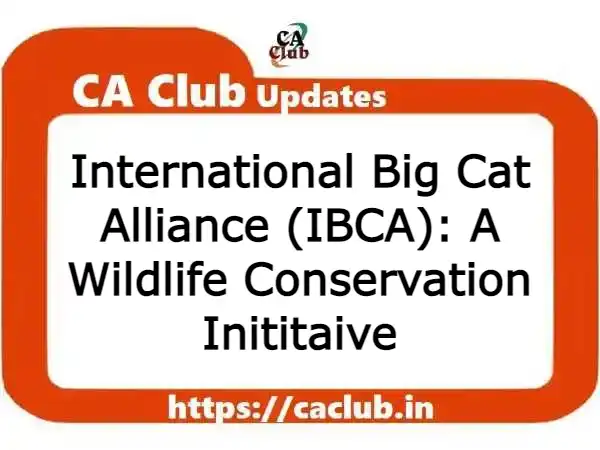On April 9th, 2023, in Mysuru, Karnataka, the Prime Minister of India, Shri Narendra Modi, launched the International Big Cat Alliance (IBCA) during an event commemorating 50 years of Project Tiger. The IBCA aims to conserve the planet’s seven big cats: Tiger, Lion, Leopard, Snow Leopard, Cheetah, Jaguar, and Puma.
India has extensive experience in big cat conservation, from the ongoing efforts for tigers, lions, snow leopards, and leopards to the recent translocation of the Cheetah to restore this extinct species to its natural habitat. The alliance will expand its reach to 97 range countries, covering the natural habitats of these big cats, and strengthen global cooperation and efforts for their conservation.
Ministerial Session on Big Cat Conservation
Shri Bhupender Yadav, Union Minister for Environment, Forest and Climate Change, chaired a session discussing the global status of big cat conservation. He emphasized that conserving big cats and their habitats could secure crucial natural ecosystems, provide water and food security for millions, and support the livelihoods of forest communities.
The Alliance will enhance global efforts and partnerships on big cat conservation while creating a platform for knowledge convergence, best practices, and support for existing species-specific intergovernmental platforms. It will also provide direct assistance to recovery efforts in potential range habitats.
Big Cats as Mascots for Sustainable Development
Shri Yadav highlighted that big cats can serve as mascots for sustainable development and livelihood security. Through the IBCA, India and other big cat range countries can promote environmental resilience and climate change mitigation. This initiative aims to ensure natural ecosystems continue to thrive and become central to economic and development policies in the “Amrit Kaal.”
Praise from Big Cat Range Countries
Ministers from big cat range countries acknowledged and appreciated India’s leadership in big cat conservation. They praised the efforts of the Prime Minister, Union Minister, and senior forest officials of the Ministry of Environment, Forest & Climate change.
Ministers from Bhutan, Bangladesh, Cambodia, Kenya, Nepal, Ethiopia, and Malaysia expressed their gratitude for India’s guidance and assistance in conservation efforts. Other countries, including Suriname, Armenia, Tanzania, Nigeria, Vietnam, Thailand, and Laos, also showed their appreciation for the initiative.
Moving Forward with the IBCA
Union Minister Shri Bhupender Yadav acknowledged the overwhelming support and pledged to work on modalities to advance the launch of the IBCA. He thanked all participants for their involvement, signaling a promising future for the International Big Cat Alliance and the conservation of the world’s most iconic big cats.
Next Steps for the International Big Cat Alliance
As the International Big Cat Alliance moves forward, several key steps will be taken to ensure the effective implementation of this global conservation initiative.
1. Establishing a Framework and Governance Structure
A well-defined framework and governance structure will be established to manage the alliance, enabling smooth coordination among the participating countries. This structure will ensure that the IBCA’s goals are met and that resources are allocated efficiently.
2. Developing a Comprehensive Conservation Strategy
A comprehensive conservation strategy will be formulated, taking into account the unique challenges faced by each big cat species and their habitats. This strategy will include habitat restoration, population monitoring, community engagement, and anti-poaching measures.
3. Promoting Knowledge Exchange and Capacity Building
The IBCA will facilitate knowledge exchange and capacity building among participating countries. This will include sharing best practices, technologies, and scientific research related to big cat conservation, as well as organizing training and capacity-building workshops for forest officials, policymakers, and other stakeholders.
4. Mobilizing Resources and Funding
Securing adequate funding is crucial for the success of the IBCA. Participating countries and international organizations will collaborate to mobilize resources and explore innovative financing mechanisms, such as public-private partnerships, to support conservation efforts.
5. Raising Public Awareness and Engagement
Public awareness and engagement are essential for the long-term success of big cat conservation. The IBCA will work towards creating targeted campaigns to raise awareness about the importance of big cats and their ecosystems, highlighting the need for conservation efforts and encouraging public participation in various initiatives.
6. Monitoring and Evaluation
Regular monitoring and evaluation of the IBCA’s progress will be conducted to assess the effectiveness of conservation efforts and identify areas for improvement. This will enable the alliance to adapt its strategies and remain agile in addressing emerging challenges.
By taking these steps, the International Big Cat Alliance will work towards securing a future where big cats and their ecosystems continue to thrive, contributing to global environmental resilience, climate change mitigation, and sustainable development.

Want to be a part of international Big cat alliance. how to register so that we can become a member of it.